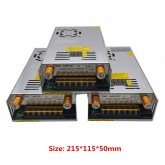Or this one to get me 60 Amps:
MEAN WELL LRS-350-3.3 Switching Power Supply, Enclosed. Products in stock and ready to ship. Quotes, samples and datasheets at Jameco Electronics.

www.jameco.com
It is about $40 plus shipping.
That may not be the best meanwell power supply for the purpose. It lists the protection as "hiccup mode" from what I understand this will not work well for this purpose (it is not current limiting).
The HRP, HRPG, and some models of the RSP series might be better fits
The...
RSP-500-3.3 or
RSP-150-3.3,
HRP-300-3.3,
HRPG-300-3.3
...all have the "constant current limiting" protection mode.
An additional benefit of the RSP-500 is it has
remote control (as do some of the other models) and
remote sense (which means it can be setup to compensate for voltage drop). But one downside is the 3V model tops out at 3.6V and the 4V model starts at 3.6V, so there is not a model that gives you the full useful range (unless you never plan to charge to 3.65)
Voltage adjustment range varies between the different PSU's. Most can be adjusted in the ballpark of 3.0-3.8, but some--including the RSP-500--top out closer to 3.60
It is important to note that the features and specs of these power supplies can be subtly different. Even within a certain product line (RSP-500, RSP-150, and RSP-320 have different features and protections for instance).
If you search meanwell on this forum there are a few good posts discussing all this in more detail.



